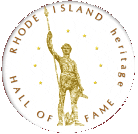Inductee Details
< BackRev. Dr. Elisha Benjamin Andrews
(1844-1917) ~ Inducted 2010Andrews, Elisha Benjamin, 1844-1917
Although E. Benjamin Andrews had only one eye – the result of a Civil War wound at the Battle of the Crater–some might say he was one of the most visionary presidents of Brown University. During his nine-year tenure as the eighth chief executive of Brown, he moved it from its status of a college to that of a university, drove it in the direction of a research institution, and opened opportunities for women by establishing Pembroke. Any one of these accomplishments would have earned him recognition as a distinguished and accomplished educator, but all of these were mastered while he performed his own scholarship. In addition, Andrews was an inspiring figure in the classroom and in the pulpit on Sunday.
“Benny,” as he was called, developed a remarkable comradery with the students as a classroom teacher, which continued into his presidency. Andrews became acquainted to an extraordinary degree with his student body. Their respect and loyalty rallied to his advantage when his outspoken political support of bimetallism in the U.S. presidential campaign of 1896 threatened to doom his career at Brown.
Andrews’ abiding interest in his students of all backgrounds was a model for any presidency. He took an interest in a young, but impoverished degree candidate by the name of James H. Higgins. Higgins had missed the ‘cut’ for financial aid to be admitted as a freshman only to discover a student loan had miraculously appeared allowing his enrollment. Later, after beginning a successful career as a Rhode Island attorney, he returned to Brown to discharge the loan. It was then he discovered the amount had not come from the university but had been personally underwritten by Andrews. Higgins went on to become the first Catholic to be governor of Rhode Island and to remove the figurative sign on the Executive Chamber that “no Irish need apply.”
The “Andrews effect” extended also to those of greater means, such as John D. Rockefeller, Jr. and Mary E. Wooley, whose Brown education led her to become president of Mount Holyoke College. Another student personally assisted by Andrews was the black scholar, John Hope.
All of these warm recollections and associations flooded back in the form of letters and petitions to the Brown corporation during the so-called “Andrews Controversy.” Fearing the loss of alumni financial support, some members of the corporation took Andrews to task for his support of the monetary system reform proposed by William Jennings Bryan which would have elevated silver to a status along with gold to back the currency of the United States. Andrews took this rebuke as an abrogation of his right of free speech and delivered a letter of resignation. With the outpouring of support on his behalf, the corporation retracted its rebuke and Andrews withdrew his resignation, but not before the issue achieved national notoriety in 1897.
Andrews had been born to a family of Baptist ministers in Hinsdale, New Hampshire in 1844. He attended a series of preparatory academies prior to entering the Civil War, arrived at Brown in 1866 and graduated in 1870. Deciding at first to pursue the ministry, in 1874 he earned a degree from Newton Theological Seminary. In the next year he assumed the presidency of Dennison University in Ohio, but returned to Newton in 1879 as a professor of theology. Drifting into the fields of history and political economy, he came back to Brown in 1883 where he wrote several texts on U.S. political history and the Constitution. His classes were extremely popular. In 1888 he left Brown to teach at Cornell, but within a year returned again to Brown to serve as its president.
After his nine-year tenure as president of Brown, Andrews became superintendent of the Chicago public schools for a two-year period and completed his educational career as the chancellor of the University of Nebraska, where he was instrumental in establishing schools of education, medicine, and law.
Declining health forced his retirement from Nebraska in December 1908. It was his final academic position. He and wife Ella retired to Florida in 1912 where Andrews died five years later, survived by his wife and two children.
- Albert T. Klyberg, L.H.D.
See more inductees in:
- Education & Universities
< Go back
Browse through our collection of 750+ amazing Rhode Islanders:
Search by Name or Keyword:
Area of Accomplishment:
African Americans | Agriculture / Farming | Architects & Designers | Artists & Painters | Banking / Finance | Business / Entrepreneurs | Civic Leaders | Civil Engineer | Civil Rights / Abolitionists | Clergy | Craftsmen | Dance | Econonomics / Theory | Education & Universities | Entertainment Development | Explorers & Adventurers | Famous RI Families | Food / Culinary | Founders of Rhode Island | Government & Politics | Historians/Historical Accounts, Preservation | Immigrants: Chinese | Immigrants: Irish | Immigrants: Portuguese | Industry - General | Industry - Jewelry | Industry - Maritime | Industry - Textiles | Inventors & Inventions | Labor / Unions | Law / Legal Pioneers | Literature / Writers / Newspapers | Medicine & Health Care | Military | Music (Singers, Composers) | Native Americans | Olympic Athletes | Philanthropists | Religion & Churches | Retail Pioneers | Rogues | Sports - Baseball | Sports - Basketball | Sports - Football | Sports - Golf | Sports - Hockey | Sports - Other | Sports - Tennis | Sports - Track and Field | Technology & Science | Theater | TV & Radio | Women |
